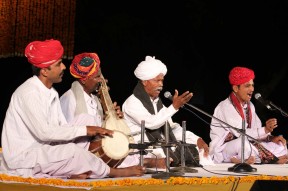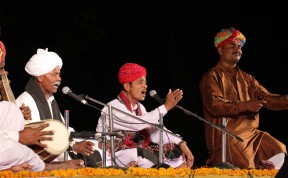 It is almost dusk and the sun looks like a luminous paper lantern hanging in a distant balcony. The sky’s canvas is slowly getting transformed into an abstract medley of red and orange strokes. On the earth below, in a corner of Nehru Park where Bhakti Utsav took off last evening, a different magic is happening. The Manganiar singers – who have come to Delhi all the way from the sandy dunes of Rajasthan – are beginning to tune their folk instruments, humming at the same time lilting desert melodies as they prepare for their debut performance at the three-day festival.
It is almost dusk and the sun looks like a luminous paper lantern hanging in a distant balcony. The sky’s canvas is slowly getting transformed into an abstract medley of red and orange strokes. On the earth below, in a corner of Nehru Park where Bhakti Utsav took off last evening, a different magic is happening. The Manganiar singers – who have come to Delhi all the way from the sandy dunes of Rajasthan – are beginning to tune their folk instruments, humming at the same time lilting desert melodies as they prepare for their debut performance at the three-day festival.
Wearing the traditional Rajasthani bandhni (tie & dye) headgear, the group of five – the eldest singer is 63 – prefers to break into an impromptu song every time you ask them a question.
“Manganiars have a song for every occasion. No Hindu festival or celebration, ritual or rite is considered complete in a Rajasthani household without our singing,” says Dera Khan, who has never learnt the alphabet but knows where France is. His group had performed at Festival of India, France, in 1980. He also knows that flights to Moscow are “badly maintained!” He also adds that there is a “lot of demand for folk singing in India now” but that their own children “must go to school to learn new technology and ways of the world.”
The Manganiars, however, have not always been so aware of the economics of life. For generations together, Manganiars, a muslim community living mostly in the desert districts of Barmer and Jaisalmer in Rajasthan, have been singing in the homes of their Rajput jajmans (patrons), never stepping out of the comfort zone of their goodwill and patronage. It was only in 1978, when Jodhpur-based musician Komal Kothari, lent them institutional support, that the Manganiars began to sing outside the state.
Dera Khan Manganiar has himself spent a lifetime singing at the Nath Sampradaya Mutth in Miajalar, Jaisalmer. What makes this group different from the other Manganiars is that it specialises in singing Gorakhnath bhajans.
 Gorakhnath was an eighth century saint, a Shiva bhakt (follower) with affiliations to Shaivism to whom a number of works are ascribed such as the first book on Laya Yoga, Goraksha Samhita, Goraksha Gita and Siddha Siddhanta Paddhhati. Some modern day masters proclaim Gorakhnath to be one of the four great innovators of the Indian religion alongside Patanjali, Buddha and Krishna. “Through him,” says Dera Khan, “a new type of religion was born. Without Gorakh, there could be no Kabir, no Nanak, no Dadu, no Vajid, no Farid, and no Mira – without Gorakh none of these are possible.”
Gorakhnath was an eighth century saint, a Shiva bhakt (follower) with affiliations to Shaivism to whom a number of works are ascribed such as the first book on Laya Yoga, Goraksha Samhita, Goraksha Gita and Siddha Siddhanta Paddhhati. Some modern day masters proclaim Gorakhnath to be one of the four great innovators of the Indian religion alongside Patanjali, Buddha and Krishna. “Through him,” says Dera Khan, “a new type of religion was born. Without Gorakh, there could be no Kabir, no Nanak, no Dadu, no Vajid, no Farid, and no Mira – without Gorakh none of these are possible.”
“Hum peedhiyon se har Shivratri mein apne mutth par Gorakhnath ji ke bhajan gaate hain, (we have been singing Gorakhnath bhajans every Shivratri at our mutth),” adds 25-year-old Roje Khan, who studied till the 10th standard before joining his father Dera Khan’s group.
Ask him if he ever yearns to participate in reality shows that have suddenly made rustic, folksy singing fashionable and he shoots back, “Where is Swaroop Khan of Indian Idol now? Television is enticing but gives you nothing but short-term fame. I would rather carry on my family tradition through more serious platforms like the Bhakti Utsav.”
Point taken, we turn to the musicians who accompany the lead singers on khamaicha, khartal and dholak, instruments that are as pristine in their form as they were when “our grandfather and the generations before him used these.” “We have no use for technology. We are not formally trained in any sargam, our music comes from our heart,” says Satar Khan who has been playing the dholak for 15 years now.
And what a spellbinding music it is. Using unique ragas that the Manganiars have created – gond malhar, suhaab, morath, khamachi, dhaani and maaru – for their full-throated music, each song connects us to our roots. “Hum apne gaano mein ras gholte hain, chahe woh ped-paudhon ke baare mein ho, suraj-chand ke baare mein ho ya phir sajaye hue ghode-haathiyon ke baare mein, hamara sangeet humein apni dharti ke kareeb laata hai (our songs are dipped in honey, whether they are about trees and plants, sun and moon or decorated horses and elephants. Our music brings us close to mother earth),” says Dera Khan.
By now, the sky has turned dark and the stars are twinkling brightly in tune with the music. They too like us, are enchanted.
Today’s programme at Bhakti Utsav @ Nehru Park, New Delhi –
Vedic chanting by Panini Kanya Mahavidyalaya (Varanasi), Krishna Bhajans by Aditi Upadhyay (Bangalore), Kabir bhajans by Shafi Mohammad Faqir (Pakistan), Carnatic Bhakti songs by Vijay Shiva (Chennai) and Hanuman bhajans by Rajan-Sajan Mishra (Delhi). From 6.30 pm onwards.






Mr. D are Khan are verigood sufi sindhi singer I know him
mr.dare khan wonderful voice nd best singer of the mangniyar community god bless u